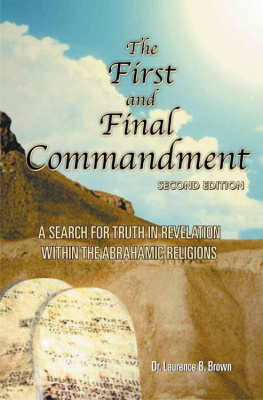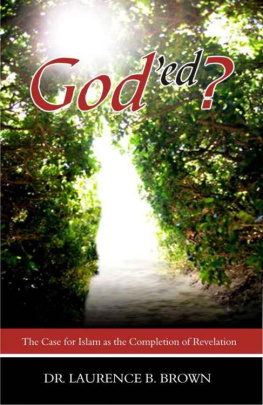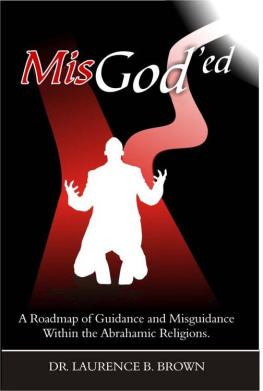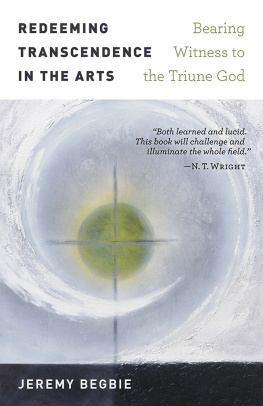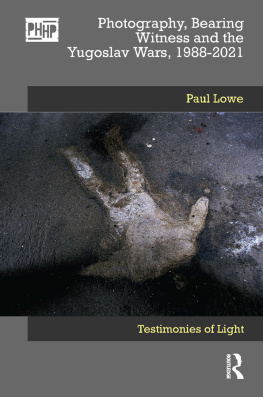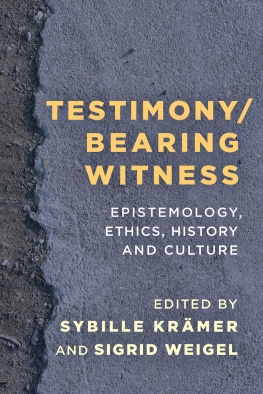Dr. Laurence B. Brown - Bearing True Witness
Here you can read online Dr. Laurence B. Brown - Bearing True Witness full text of the book (entire story) in english for free. Download pdf and epub, get meaning, cover and reviews about this ebook. year: 2014, publisher: Darussalam Publishers, genre: Romance novel. Description of the work, (preface) as well as reviews are available. Best literature library LitArk.com created for fans of good reading and offers a wide selection of genres:
Romance novel
Science fiction
Adventure
Detective
Science
History
Home and family
Prose
Art
Politics
Computer
Non-fiction
Religion
Business
Children
Humor
Choose a favorite category and find really read worthwhile books. Enjoy immersion in the world of imagination, feel the emotions of the characters or learn something new for yourself, make an fascinating discovery.
- Book:Bearing True Witness
- Author:
- Publisher:Darussalam Publishers
- Genre:
- Year:2014
- Rating:4 / 5
- Favourites:Add to favourites
- Your mark:
- 80
- 1
- 2
- 3
- 4
- 5
Bearing True Witness: summary, description and annotation
We offer to read an annotation, description, summary or preface (depends on what the author of the book "Bearing True Witness" wrote himself). If you haven't found the necessary information about the book — write in the comments, we will try to find it.
Bearing True Witness — read online for free the complete book (whole text) full work
Below is the text of the book, divided by pages. System saving the place of the last page read, allows you to conveniently read the book "Bearing True Witness" online for free, without having to search again every time where you left off. Put a bookmark, and you can go to the page where you finished reading at any time.
Font size:
Interval:
Bookmark:
Bearing True Witness

By: DR. LAURENCE B. BROWN, MD
Published By: Darussalam Publishers

ALL RIGHTS RESERVED
No part of this book may be reproduced or utilized in any form or by any means, electronic of mechanical, including photocopying and recording or by any information storage and retrieval system, without the written permission of the publisher.

Contents
One of the first lessons I learned as a new author was to narrow the subject of my books, and define the audience for which they were written. Hence, the dream of one book grew into the reality of two, with a third planned to complete the trilogy.
This present book is the second in the series.
The first book in this series was written to guide those seeking the religion of truth. This first book, entitled The First and Final Commandment (Amana publications), argues the continuity of revelation from Judaism to Christianity, and then to Islam.
This present book - the second in the trilogy - provides guidance in the practical aspects of the Islamic religion, and is intended for converts and for those Muslims who seek to clarify their religion.
The third book in the series is in the planning stage, as of the date of this writing, but is intended to address the many disingenuous criticisms and blatant slanders leveled against Muslims and the Islamic religion. Topics such as polygamy, slavery, racism, the female headscarf, oppression of women, terrorism, "fundamentalism," idolatry and others are to be discussed with similar methodology to that employed in The First and Final Commandment.
The order of this series of books, then, is to present the Islamic religion as the final revelation and fulfillment of predictions of the Jewish and Christian scriptures in the first book, to suggest the manner in which the Islamic religion should be practically applied in the second, and to provide the confirmed Muslim with defense against the most common slanders against Islam in the third.
Regarding the present work, Muslims frequently observe that converts to the Islamic religion progress through several stages of ideological, spiritual, and psychological growth before achieving a semblance of religious maturity. The period of maturation varies from one individual to another, as does the end result. Some Muslims have shown remarkable religious maturity as children. Others experience dramatic reversal of ideology late in life. The renunciation of extreme Sufism by the famous eleventh century (CE) Imam Al-Ghazali (full name: Abu Haamid Muhammad Al-Ghazali) in later life, and the refutation of his errors in aqeeda by the tenth century (CE) Al-Ash'aree (full name: Abu Al-Hasan 'Ali ibn Ismaa'eel al- Ash'aree, to whom the Ash'aree aqeeda is attributed), also late in his days, serve as prominent examples. In more recent history, Malcolm X's transition from the racist and ideologically condemned political cult known as the Nation of Islam to orthodox (Sunni) Islam is perhaps the best known example.
In the beginning, Muslim converts frequently embark upon widely divergent ideological paths on the grayscale that spans the gap between the clear purity of correctness and the murky darkness of deviation. Although many eventually settle upon the path of Islamic correctness, a large number also become confirmed upon degrees of deviancy, sometimes of such a mild degree as to warrant naught but advice, occasionally of such magnitude as to warrant punishment according to the Shari'a (Islamic law), and all too often of such severity as to invalidate a person's shahada (testimony of faith) entirely, meaning that the person in question, whether knowingly or not, invalidates their claim to being Muslim and leaves the religion of Islam.
For the individual, the importance of correctness of religious path relates to salvation. For the community, the importance relates to the errors of the deviants misrepresenting Islam.
The author, being a Western convert to the Islamic religion, has lived the heedless hedonism that accompanies absence of religion, the awakening of spiritual awareness in the heart of the seeker, the soulful search for truth, the cautious sifting of religions for ingredients of value and consistency, the serenity of embrace of truth when found, and times both pleasant and unpleasant following and at all points in the process. Having lived and worked as a Muslim in the Western countries of America and England, and subsequently in the Holy City of Medina Al-Munawara has conferred a depth of experience that may be of interest to those who seek a similar path.
Nonetheless, what follows is not a book of memoirs, but rather of analysis. The fact is that the presented issues have been analyzed by Islamic scholars since the time of revelation, and the correct path for each issue has been defined since the time of the last messenger, Muhammad (Peace and Blessings of Allah be upon him) ibn Abdullah The paucity of information available in the English language, however, results in many Western converts being ill- informed and, as consequence, easily mislead.
The information that follows is the author's best attempt at rectifying that unfortunate situation.
The choice having been made, a person enters Islam and becomes Muslim with the shahada, or testimony of faith. This testimony (transliterated from Arabic) reads, "Ash-hadu an la ilaha illallah (u), wa ash-hadu anna Muhammad an Rasulullah and is translated, "I testify that there is no god (also translated, 'there is no object worthy of worship') but Allah and I testify that Muhammad (Peace and Blessings of Allah be upon him) is the Messenger of Allah."
The shahada is most traditionally stated in public, for in general, converts should let their conversion be known. However, should the situation necessitate it, the shahada may be stated with none other than The Creator for witness.
The shahada not only affirms divine unity and the Prophethood of Muhammad ibn Abdullah (Peace and Blessings of Allah be upon him) but also commits the faithful to all that is enjoined by the religion, and to abstain from all that is forbidden. Hence, although the statement says nothing about prohibition against fornication, adultery, alcohol, etc., acceptance of these prohibitions is inextricably coupled with the shahada. For to accept Muhammad (Peace and Blessings of Allah be upon him) as a Prophet, and for that matter, as the final Prophet, mandates acceptance of the message and laws that were revealed through him. Anything less is hypocrisy.
The first duty of a convert, then, is to fully understand the meaning of the shahada, and begin to live it. Scholars teach that the shahada is not valid without seven elements: knowledge, sincerity, honesty, love of the shahada, certainty, abstention from anything that negates the shahada, and application (or, in other words, to live the testimony of faith) Many excellent books have been written on this subject, and there is little or no point in duplicating previous works, although a brief outline is perhaps in order. To begin with, the commitment of greatest and most obvious importance when stating the shahada is the recognition of monotheism (i.e., the oneness of Allah, which is captured in the Arabic language by the term tawheed). This point cannot be stressed too strongly. Islam is the religion of tawheed. Any compromise to Islamic monotheism, any compromise to the supremacy and absolute Oneness of Allah constitutes shirk. Shirk exists in varying degrees, from major shirk, which takes a person out of Islam, to minor shirk, which ranks as a major sin, to riyaa, or hidden shirk. Examples of major shirk are to worship other than Allah or to join partners in worship with Allah. Examples of minor shirk include swearing an oath by other than Allah or trusting to 'good luck' charms. Lastly, examples of hidden shirk are to beautify a person's prayer when aware that someone else is watching, or to give more in charity than a person would otherwise when aware that the donation is being observed. Given the critical importance of these partner subjects of tawheed and shirk, further study in books devoted to these subjects is strongly recommended. (Such books are readily available online through a variety of Islamic bookstores).
Font size:
Interval:
Bookmark:
Similar books «Bearing True Witness»
Look at similar books to Bearing True Witness. We have selected literature similar in name and meaning in the hope of providing readers with more options to find new, interesting, not yet read works.
Discussion, reviews of the book Bearing True Witness and just readers' own opinions. Leave your comments, write what you think about the work, its meaning or the main characters. Specify what exactly you liked and what you didn't like, and why you think so.


